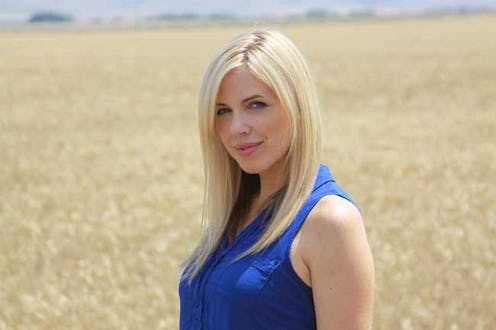Books
Sarah Jio on Writing 'Morning Glory'

There are two women to worry about in Sarah Jio's fifth novel, Morning Glory (Plume): Penny, who disappeared in the 1950s, and Ada, whose grief weighs on her in the present day. Jio braids together the stories of these women, who both lived in the same houseboat in Seattle's Lake Union decades apart, and sprinkles in bits of mystery — what happened to Penny? Did she find happiness? — with romance — will Ada love again? These questions keep the reader curious and turning the pages. The dreamy houseboat setting — think Sleepless in Seattle — provides the perfect backdrop for the intriguing narratives. The lovely little floating home that unites these women holds all the clues for their stories. At once emotionally resonant and imaginative, Morning Glory winds together two women who the reader will worry, weep, and wonder about.
Jio answered our questions about crafting Morning Glory.
BUSTLE: How did your interest in the Seattle houseboat community unfurl?
SARAH JIO: I grew up in the Seattle area and always loved the floating home community on Lake Union, and then, of course, the little movie, Sleepless in Seattle, came out, and I was forever smitten with the idea of houseboat life. So when I began writing novels, I always knew I'd one day set a novel on a houseboat. And, I was incredibly fortunate to be able to rent a fabulous little houseboat on Lake Union as my "office" while writing Morning Glory. That experience informed so much of the setting and backdrop for the novel.
What do you love about living in Seattle?
I love coffee and rain and clouds, and I'd much rather wear a sweater than anything else. I like the easygoing, sometimes introverted nature of Seattleites. We're a fairly unpretentious bunch. And there are good restaurants everywhere.
The language in your description of Ada'a grief reminded me of the language and scenes in The Year of Magical Thinking. Which other grieving characters or authors influenced your descriptions of Ada's feelings?
I have heard amazing things about The Year of Magical Thinking and it's one of several books I plan on reading in 2014. In terms of character inspiration for Ada, I had no one in particular. I simply modeled her on a feeling, and a question: I asked myself how it would feel to go through such incredible loss, and I channeled those feelings into her character.
What are the challenges of writing about grief? About a mystery?
Grief is hard, because you really feel those emotions as you write them. It may sound cheesy, but I often cry as I write hard scenes because I feel them just as my characters do. I think when an author feels her character's deepest emotions, her readers will, too. So I work hard on making those emotions as authentic and heartfelt as they can be. As for mystery, I use the trail of crumbs analogy: I love leaving little clues for readers throughout the book (and, I also love thinking of ways to throw readers off, too!).
What's your writing process like? Do you plan your plots first?
I start with a title (always something that hooks me) and then I launch into the plot. I usually will write up a few pages of synopsis about the story, then I do something unconventional: I write the last chapter first. It's very satisfying to type "The End" when I've written just one chapter. But ultimately, writing the ending first gives me a good target while writing.
What are you most proud of in this book?
The love story between Penny and Collin. I still think of them! And I felt their scenes together were so true and real. When I was renting the houseboat while writing the novel, I almost expected them to show up on the dock walking hand-in-hand.
Photo: Sarah Jio